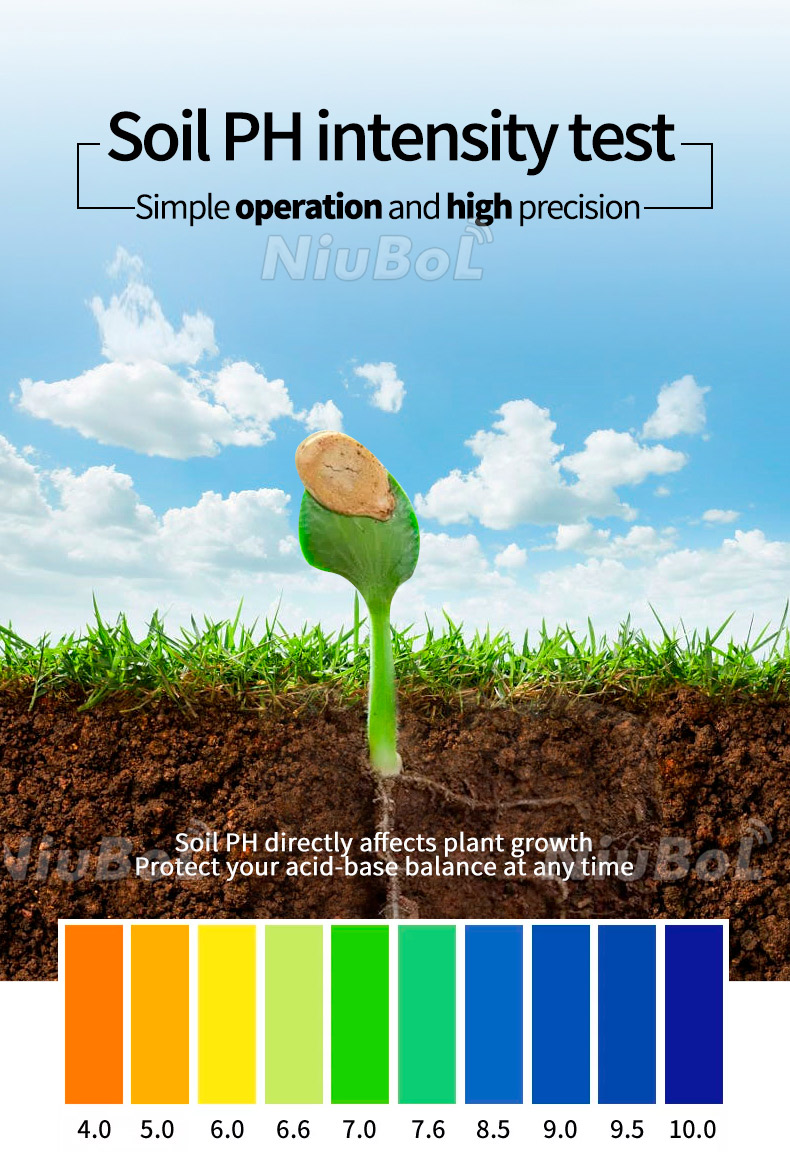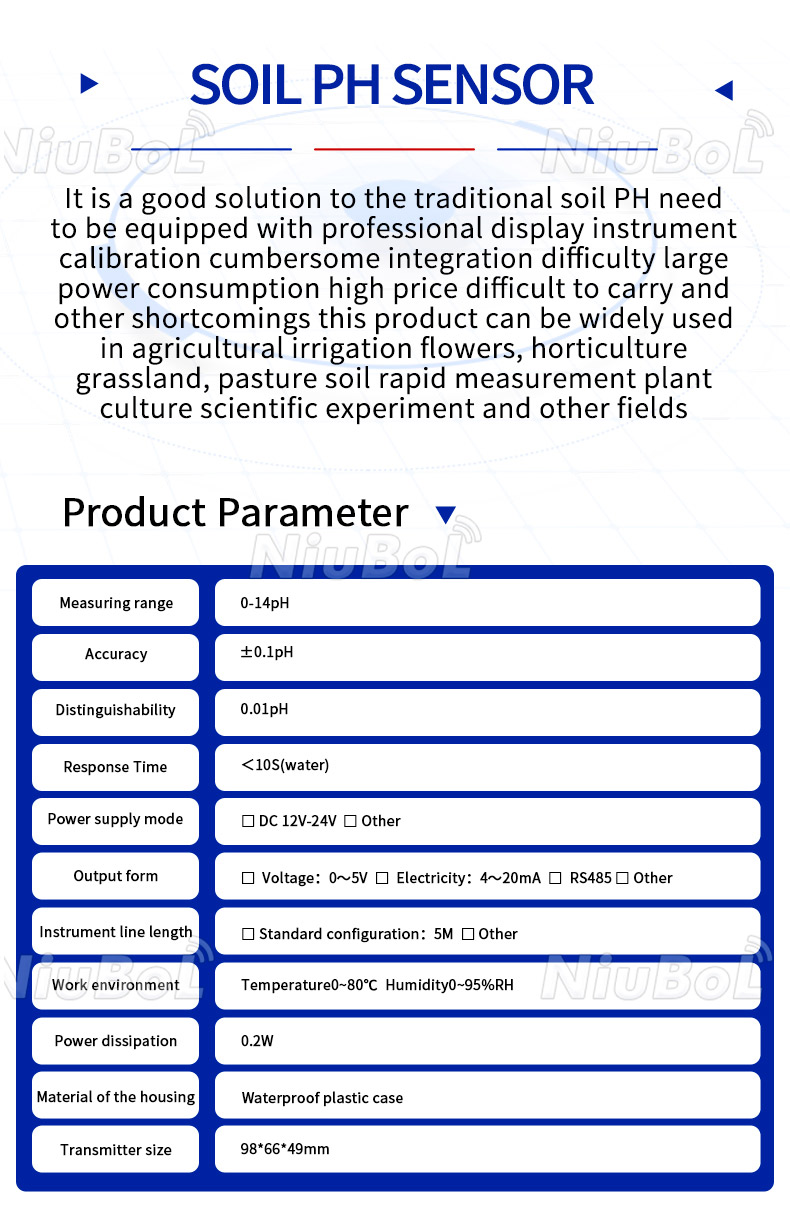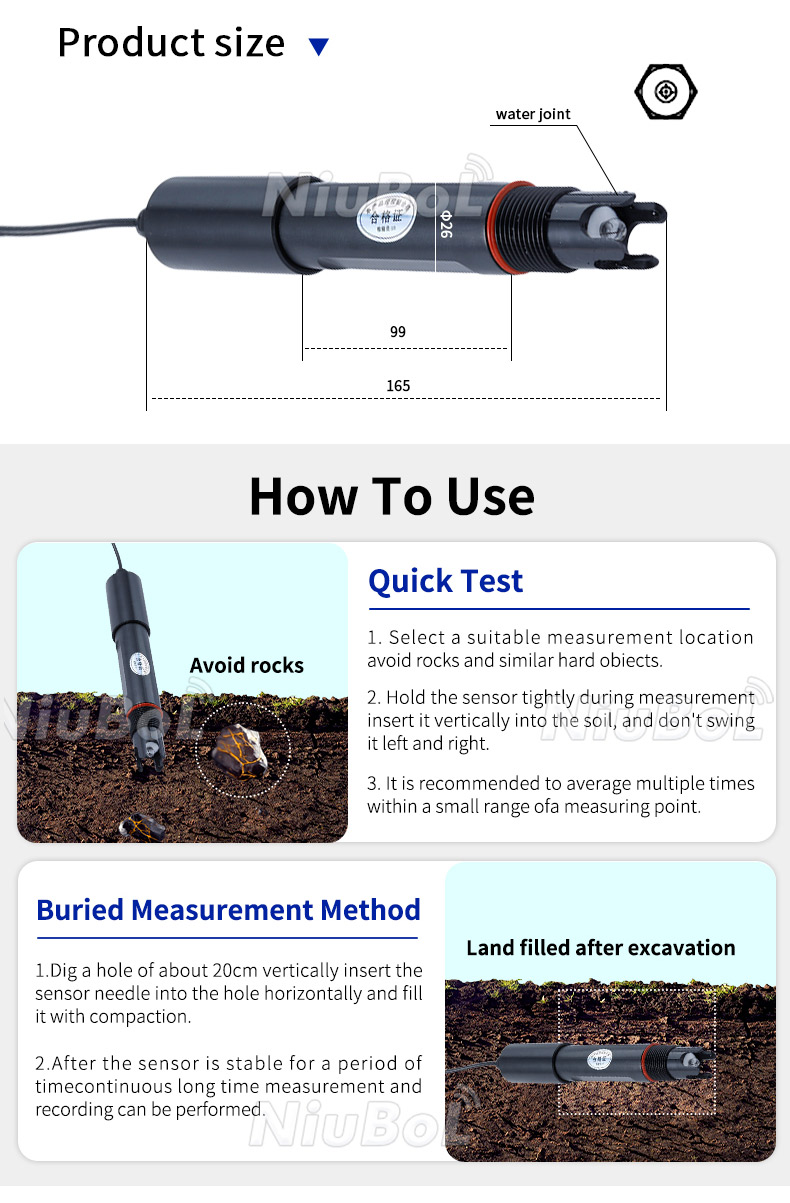

— Blogs —
—Products—
 Consumer hotline +8618073152920
Consumer hotline +8618073152920 WhatsApp:+8615367865107
Address:Room 102, District D, Houhu Industrial Park, Yuelu District, Changsha City, Hunan Province, China
Product knowledge
Time:2024-06-29 22:08:20 Popularity:2169
Measuring the pH of the soil is an important method of understanding the acidity and alkalinity of the soil and is of great importance to agricultural production. Soil pH directly affects the effectiveness of nutrients in the soil, which in turn affects the growth and development of crops. Following are the methods of measuring soil pH and their importance:
1. Glass electrode method: this is a common laboratory method to determine the pH of soil leachate by means of a glass electrode. Insert the pH meter probe into the mud and make sure that the probe is clean and calibrated. The probe is held in the slurry for 60 seconds and a reading is taken. pH ranges from 1-14, where a pH of 7 indicates neutral soils, above 7 alkaline soils and below 7 acidic soils. 2. Potentiometric titration: This is a common laboratory method for determining the acidity or alkalinity of soil leachates using a glass electrode.
2. potentiometric titration: the soil leachate is titrated using a standard acid or base solution and the pH is determined from the required titration volume.
3. colorimetric method: determines pH by detecting a color change in reaction with a specific indicator.
4. portable pH meter: rapid determination of soil pH in the field, facilitating immediate decision-making by agriculturalists.
5. Soil pH sensor: can be implanted in the soil to monitor changes in soil pH in real time.

The effect of soil pH on plants
Soil pH is a measure of soil acidity and alkalinity, which has an important impact on plant growth and development.
1. Nutrient effectiveness: When soil pH is <6.0, the effectiveness of most nutrients decreases, forming ineffective nutrients. For example, elements such as molybdenum and phosphorus tend to form deposits in acidic soils, reducing their efficiency of absorption and utilization by plants.
2. Root growth: Soil that is too acidic or too alkaline will affect the growth of plant roots. Soil acidification will cause the normal granular structure of the soil to be destroyed, aggravating the problem of soil crusting, making it difficult for crop roots to extend, and weakening the ability to produce roots as well as to promote rooting and root nourishment.
3. Disease risk: Acidic soil inhibits the survival of beneficial microorganisms, but also favors the survival of some harmful microorganisms, thus increasing the risk of crop diseases.
4. Quality impact: Soil acidification promotes the release and activation of aluminum, manganese, chromium and other toxic elements in the soil, affecting the quality of agricultural products.


Impact of soil pH on crops
The impact of soil pH on crops is mainly reflected in the yield and quality.
1. Yield impact: when the soil pH value is 4.5-5.5, the average yield per acre of grain is reduced by about 15% compared with the normal cultivated land; when the soil pH <4.5, the average yield per acre of grain is even reduced by about 50%, which seriously jeopardizes the food security.
2. Quality impact: Soil acidification will affect the crop fruit yield and quality, such as causing low fruit yield, poor quality and other problems.
Why measure soil pH:
1. Nutrient Effectiveness: Soil pH affects the form of nutrients in the soil and the ability of plants to absorb them. For example, increased concentration of aluminum ions in acidic soils may poison plant roots; while in alkaline soils, nutrients such as calcium and phosphorus may form insoluble complexes, reducing the efficiency of plant uptake.
2. Crop growth adaptation: Different crops have different adaptation ranges to soil pH. Understanding soil pH helps to choose the right type of crop to grow.
3. Decision-making for soil improvement: By measuring soil pH, it is possible to decide whether or not to improve the soil according to need, such as applying lime to raise soil pH or using sulfur to lower soil pH.
4. Fertilizer selection: Knowing the soil pH helps to select the right type of fertilizer, e.g. using alkaline fertilizer in acidic soil and acidic fertilizer in alkaline soil.
5. Guiding agricultural production: Based on the results of soil pH testing, farmers can be guided to apply fertilizers, irrigation and other agricultural production activities in a rational manner to improve the yield and quality of crops.
6. Environmental protection: soil testing is an important part of environmental protection and agricultural development. By measuring soil pH, we can understand the content of pollutants in the soil as well as the potential risks, so as to guide agricultural production and environmental protection.

To sum up, measuring soil pH is an indispensable part of agricultural production, which provides a scientific basis for rational arrangement of crop planting, soil improvement and fertilization, and is of great significance for understanding soil quality, guiding agricultural production and environmental protection, and improving agricultural production and protecting arable land.
Related recommendations
Sensors & Weather Stations Catalog
Agriculture Sensors and Weather Stations Catalog-NiuBoL.pdf
Weather Stations Catalog-NiuBoL.pdf
Related products
 Combined air temperature and relative humidity sensor
Combined air temperature and relative humidity sensor Soil Moisture Temperature sensor for irrigation
Soil Moisture Temperature sensor for irrigation Soil pH sensor RS485 soil Testing instrument soil ph meter for agriculture
Soil pH sensor RS485 soil Testing instrument soil ph meter for agriculture Wind Speed sensor Output Modbus/RS485/Analog/0-5V/4-20mA
Wind Speed sensor Output Modbus/RS485/Analog/0-5V/4-20mA Tipping bucket rain gauge for weather monitoring auto rainfall sensor RS485/Outdoor/stainless steel
Tipping bucket rain gauge for weather monitoring auto rainfall sensor RS485/Outdoor/stainless steel Pyranometer Solar Radiation Sensor 4-20mA/RS485
Pyranometer Solar Radiation Sensor 4-20mA/RS485
Screenshot, WhatsApp to identify the QR code
WhatsApp number:+8615367865107
(Click on WhatsApp to copy and add friends)
